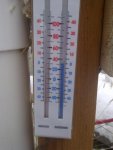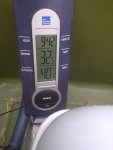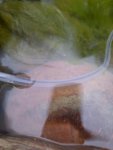Interesting concept. I'm not sure I agree with it though. But for your area it might be right.
In winter you get an inversion. That is the water at the top of the pond is colder than the water at the bottom. In the summer, the reverse is true. Wamer on top and colder on bottom.
Ice is a good insulator. The thicker the ice, the more insulation from the exterior elements.
The idea I've been taught is that you want the bubbler and heater close to the surface so as to disturb the bottom layers as little as possible. Oxygen levels aren't the concern as much in the winter as is a means for decomposition and respiratory gases to escape. If you have a pretty clean pond bottom, with little debris, and you don't have an overcrowding fish population, the pond can go a couple of weeks or longer without hole.
The problem with a bottom aerator is that as the bubbles rise, they pull water up with them. As the water is pulled up, other water needs to replace it. This usually causes water to be drawn down the side walls of the pond to the area below the aerator. Of course it depends on the shape of the pond, the strength of the aerator, the depth of the pond, the depth of the aerator, etc.
But this pulls the coldest water from the top, (possibly 33F/1C), and pulls it to the bottom and than back up the bubble column. This than makes the water on the bottom colder than it should be. I'm going to run some experiments this winter in my new pond since it doesn't have any fish in it and see if I can see some difference between having the aerator on the bottom or on the surface and how much of a difference.
But with a bottom heater, that might counteract the mixing I don't know. The earth will have a certain amount of heat but will it be enough to take advantage of in the pond? I don't know.
You'll have to let us know how it works. But I would ask the seller, if the company that designed it, has any studies on how it works and what the temperature differences were in their test pond. Can they explain any of the science behind it?
For cold weather testing you folks have a lot tougher test conditions than I'll ever have!!!
Craig







